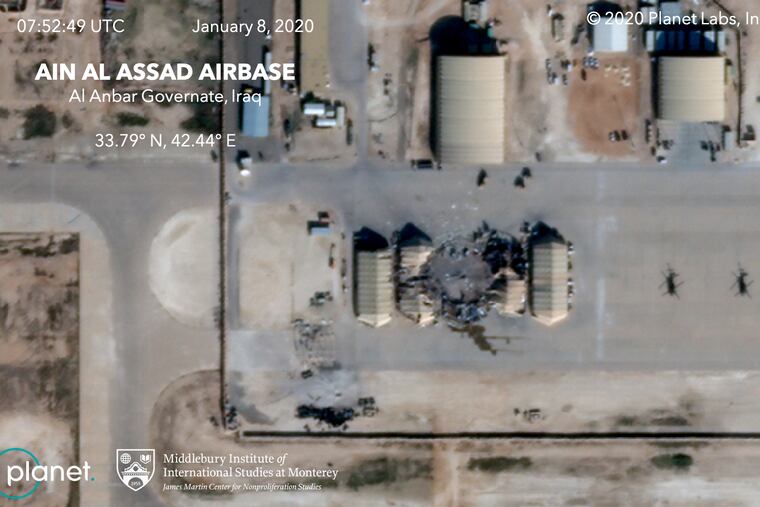Missile strike on U.S. bases ‘did not intend to kill,’ says Iranian commander
An Iranian military commander said Thursday that missiles fired at bases used by U.S. troops in Iraq were not aimed at inflicting casualties, in the latest sign that Iran was seeking to avoid any further escalation of hostilities with the United States.

ISTANBUL - An Iranian military commander said Thursday that missiles fired at bases used by U.S. troops in Iraq were not aimed at inflicting casualties, in the latest sign that Iran was seeking to avoid any further escalation of hostilities with the United States.
After more than a dozen missiles slammed into the bases early Wednesday local time, both sides for now appear to be stepping back from further conflict.
"We did not intend to kill," said Brig. Gen. Amir Ali Hajizadeh, head of the Revolutionary Guard's Aerospace Force, according to Iranian state media. "We intended to hit the enemy's military machinery." However, he repeated the government's claim that "tens of people were killed or wounded." U.S. and Iraqi officials said the strikes caused no casualties.
Iran and the United States had been on a war footing since President Donald Trump approved the killing last week of Maj. Gen. Qasem Soleimani, commander of the Revolutionary Guard's elite expeditionary Quds Force and Iran's most prominent military leader. Iran retaliated with the missile strike. By Wednesday, Iranian officials were suggesting that Iran did not intend any further attacks and Trump said he would not respond militarily to the Iranian strikes.
The soaring tensions had alarmed officials in Iraq, the main stage for the conflict between Tehran and Washington, and spooked governments throughout the region that feared a widening war.
Rocket attacks in Baghdad late Wednesday showed the risk of escalation remained. The strikes highlighted fears that Iraqi militias, backed by Iran, could pursue revenge for the killing of one of their leaders in the same attack that killed Soleimani.
Two rockets struck Baghdad's Green Zone, which hosts the U.S. Embassy and other foreign diplomatic missions, but caused no injuries, Iraqi authorities said.
Jawad al-Talibawi, a spokesman for the network of Iraqi militias known as the Hashd al-Shaabi, or Popular Mobilization Forces, told the Iraqi News Agency that the network was not responsible for the attack.
"The bombing of the Green Zone might be an individual reaction, or an attempt by some parties to distort the reputation of the Hashd and shuffle the cards," he said. "We are calling on those behind the bombing to stop these actions that distort the reputation of Hashd factions."
The statement was part of the broader effort to de-escalate tensions, but "we should all take a moment before popping the champagne," Ariane Tabatabai, a political scientist at the Rand Corporation, said in an email. Even as the violence abated, the Trump administration was "doubling down on the maximum pressure campaign, which got us here to begin with," she said, referring to U.S. pressure on Iran.
And Tehran, she added, could take further action. A tweet by Iranian foreign minister Javad Zarif that his government had "concluded" its military response "could mean a lot of things: It could mean that Iran is done for now, which is the interpretation many have chosen to embrace. But it could also mean that this specific operation is done. Others may be in store."
The tensions have continued to affect the main mission of U.S. forces in Iraq - fighting the Islamic State. The coalition said Thursday that military operations against the extremist group in Iraq would remain "paused" while it focuses on "protecting the Iraqi bases that host Coalition personnel."
The conflict between the United States and Iran sparked concern that operations against the Islamic State, or ISIS, would be sidelined at a moment when the extremists, driven from the vast swath of territory they once held, are trying to regroup in parts of Iraq and Syria.
In Iraq, hundreds of Islamic State fighters have made their way to rural areas in the north, stepping up their attacks in recent weeks, including ambushes and mortar strikes.
U.S. military officials first announced the suspension of anti-ISIS operations Sunday, as the Trump administration braced for possible Iranian attacks on military bases hosting U.S. troops in Iraq.
The same day, Iraq's prime minister urged parliament to take "urgent measures" to force the withdrawal of foreign forces following the killing of Soleimani.
Lawmakers responded by passing a nonbinding resolution calling on the government to end the foreign troop presence in Iraq.
The coalition’s statement Thursday said it was awaiting “further clarification on the legal nature and impact of the resolution on foreign troops no longer being allowed to stay in Iraq.” Its training and support of troops fighting the Islamic State has been suspended, although other activities, including countering the militant group’s propaganda, would continue, the statement said.